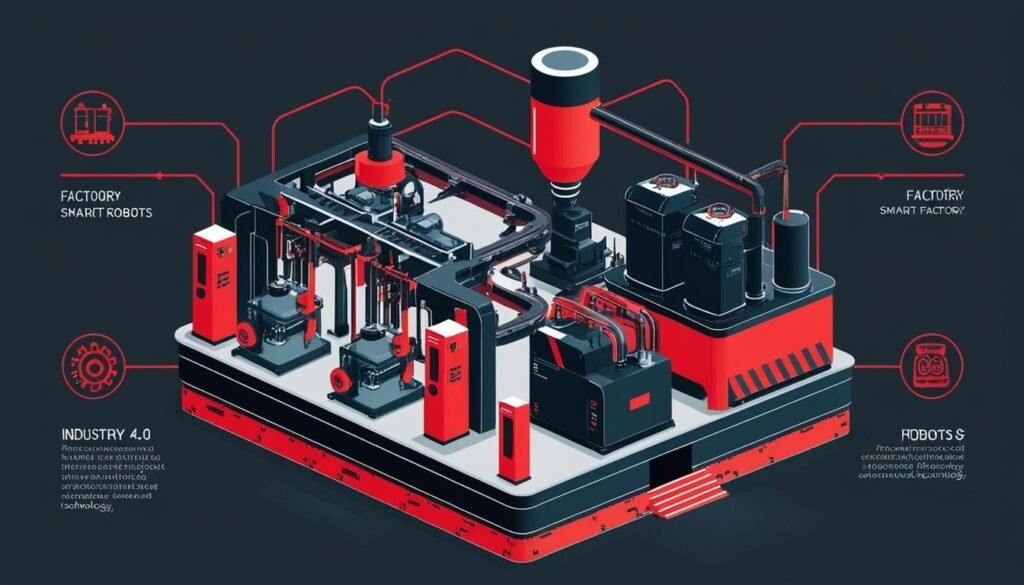The manufacturing sector is undergoing a significant transformation driven by technological advancements, with Industry 4.0 leading the charge towards smarter factories and advanced methodologies.
Over the past few decades, the manufacturing sector has experienced significant changes shaped by advancements in technology, global influences, and evolving consumer demands. As these forces converge, manufacturers are adopting new methodologies and tools to remain competitive in a swiftly transforming landscape.
At the forefront of this revolution is Industry 4.0, often referred to as the Fourth Industrial Revolution. This era is defined by the integration of cutting-edge technologies, including the Internet of Things (IoT), artificial intelligence (AI), big data, and automation into manufacturing systems. The primary aim is to develop “smart factories,” where machines and systems communicate and collaborate with greater efficiency. The IoT plays a crucial role in this interconnected system, allowing equipment such as sensors, CNC machines, and robots to relay real-time data for operational monitoring.
This integration of AI-driven analytics enables manufacturers to enhance productivity and operational efficiency. For instance, access to Overall Equipment Efficiency (OEE) data can alert companies to potential downtimes and reduce costs associated with equipment malfunctions through predictive maintenance. Additionally, the capabilities brought by Industry 4.0 allow for the customisation and personalisation of products, moving away from traditional mass production models. Many companies are now creating specialised products that cater to individual customer preferences, thereby gaining a competitive edge in the marketplace.
However, the transition towards these advanced technologies poses challenges, particularly concerning employment levels. Automation may render specific roles redundant, but there is also an expectation for a surge in demand for skilled workers capable of managing and maintaining these new systems. Furthermore, cybersecurity remains a grave concern as smart factories, reliant on interconnected technology, become attractive targets for cyberattacks.
Advanced robotics is another significant innovation shaping the manufacturing landscape. This includes the emergence of collaborative robots, or “cobots,” which are designed to work alongside human operators. These cobots can handle intricate tasks within manufacturing cells, allowing human workers to engage in more strategic roles, thus increasing overall productivity. With the integration of advanced sensors and machine learning, these robots can interpret their environments and adapt to variable conditions, further enhancing their utility in production processes.
Additive manufacturing, commonly known as 3D printing, is revolutionising the fabrication of complex parts and prototypes. This method permits the construction of components layer by layer, leading to reduced material waste and shorter lead times. Industries such as aerospace, automotive, and healthcare are increasingly employing 3D printing technology for the rapid production of lightweight, custom parts. Moreover, the technology has matured to allow for mass customisation, aligning production capabilities with specific customer demands.
Furthermore, evolving methodologies such as Lean manufacturing are gaining momentum. Initially focused on waste reduction, modern Lean encompasses a broader emphasis on value creation for customers. Techniques like Value Stream Mapping (VSM) are being enhanced with real-time data visualisation tools, enabling organisations to swiftly identify inefficiencies and streamline workflows.
The emergence of Agile Lean methodology demonstrates a synthesis of Lean principles and Agile Project Management. This approach fosters adaptability among manufacturers as they respond to shifting consumer demands and market fluctuations. Embracing collaborative frameworks, Agile Lean emphasises customer satisfaction, continuous improvement, and waste reduction across all processes.
With the rapid advancement of technology within the sector, the need for a skilled workforce is paramount. Manufacturers are investing substantially in workforce development initiatives—collaborating with educational institutions and implementing training programs to equip employees with the necessary technical skills. Leadership development is equally critical, as companies strive to cultivate effective managers from within their current workforce to navigate the demands of a modern manufacturing environment.
The manufacturing sector is amidst a profound transformation as it adapts to technological advancements, evolving practices, and shifting market expectations. With a focus on Industry 4.0 technologies, efficient methodologies like Lean and Agile Lean, and robust workforce development strategies, manufacturers are positioning themselves to thrive in a competitive global market. Nevertheless, they must also contend with the associated challenges of workforce displacement and data security in this ever-evolving arena.
Source: Noah Wire Services
- https://www.ibm.com/think/topics/industry-4-0 – Corroborates the integration of IoT, AI, and big data in Industry 4.0 to develop smart factories and enhance productivity and operational efficiency.
- https://www.ptc.com/en/solutions/digital-manufacturing/industry-4-0 – Supports the role of IoT, AI, and data analytics in predictive maintenance, collaborative product design, and agile manufacturing within Industry 4.0.
- https://rmc.utk.edu/how-industry-4-0-is-transforming-manufacturing/ – Details the convergence of digital technologies like IoT, AI, and big data analytics in Industry 4.0, and their impact on productivity, quality control, and customization.
- https://www.microsoft.com/en-us/industry/manufacturing/resources/industry-4-0-technologies – Explains how Industry 4.0 technologies, including AI, automation, and cloud computing, improve productivity, asset utilization, and operational continuity.
- https://www.ibm.com/think/topics/industry-4-0 – Discusses the use of IoT sensors and AI for real-time monitoring and predictive maintenance, reducing equipment downtime and enhancing efficiency.
- https://www.ptc.com/en/solutions/digital-manufacturing/industry-4-0 – Highlights the customization and personalization of products enabled by Industry 4.0 technologies, moving away from traditional mass production models.
- https://rmc.utk.edu/how-industry-4-0-is-transforming-manufacturing/ – Addresses the challenges of automation on employment levels and the need for skilled workers to manage new systems, as well as cybersecurity concerns.
- https://www.ibm.com/think/topics/industry-4-0 – Describes the role of advanced robotics, including collaborative robots (cobots), in enhancing productivity and adapting to variable conditions in manufacturing.
- https://rmc.utk.edu/how-industry-4-0-is-transforming-manufacturing/ – Explains the impact of additive manufacturing (3D printing) on reducing material waste, shortening lead times, and enabling mass customization.
- https://www.ptc.com/en/solutions/digital-manufacturing/industry-4-0 – Discusses the evolution of Lean manufacturing with real-time data visualization tools and the emergence of Agile Lean methodology for adaptability and customer satisfaction.
- https://www.microsoft.com/en-us/industry/manufacturing/resources/industry-4-0-technologies – Emphasizes the importance of workforce development and leadership training in navigating the demands of a modern manufacturing environment driven by Industry 4.0 technologies.















